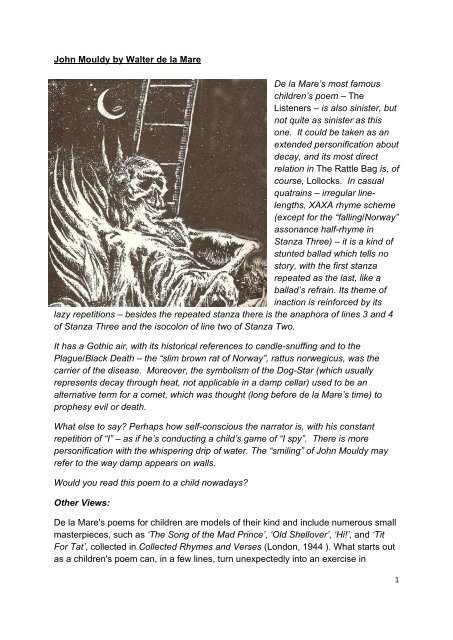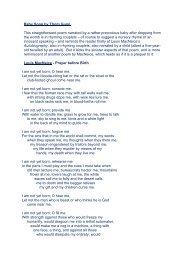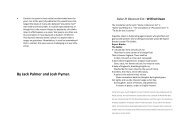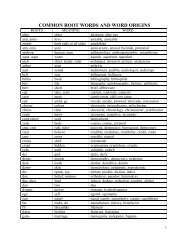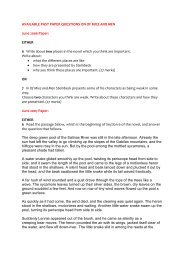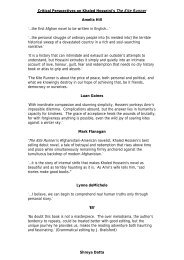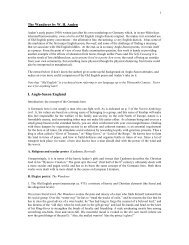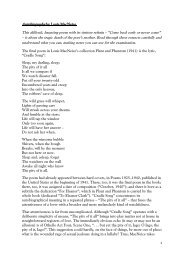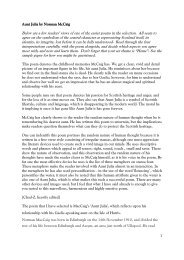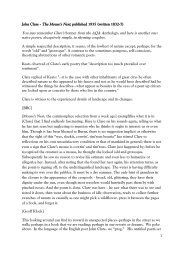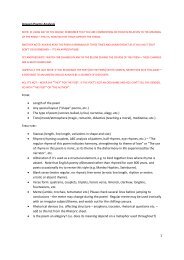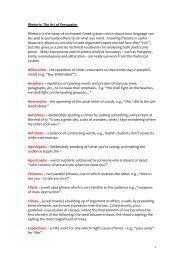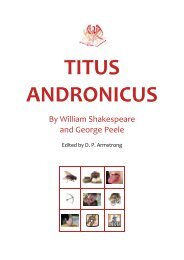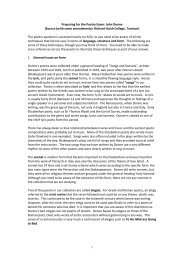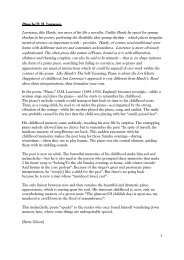John Mouldy by Walter de la Mare - Hellesdon.org
John Mouldy by Walter de la Mare - Hellesdon.org
John Mouldy by Walter de la Mare - Hellesdon.org
You also want an ePaper? Increase the reach of your titles
YUMPU automatically turns print PDFs into web optimized ePapers that Google loves.
<strong>John</strong> <strong>Mouldy</strong> <strong>by</strong> <strong>Walter</strong> <strong>de</strong> <strong>la</strong> <strong>Mare</strong><br />
De <strong>la</strong> <strong>Mare</strong>’s most famous<br />
children’s poem – The<br />
Listeners – is also sinister, but<br />
not quite as sinister as this<br />
one. It could be taken as an<br />
exten<strong>de</strong>d personification about<br />
<strong>de</strong>cay, and its most direct<br />
re<strong>la</strong>tion in The Rattle Bag is, of<br />
course, Lollocks. In casual<br />
quatrains – irregu<strong>la</strong>r linelengths,<br />
XAXA rhyme scheme<br />
(except for the “falling/Norway”<br />
assonance half-rhyme in<br />
Stanza Three) – it is a kind of<br />
stunted bal<strong>la</strong>d which tells no<br />
story, with the first stanza<br />
repeated as the <strong>la</strong>st, like a<br />
bal<strong>la</strong>d’s refrain. Its theme of<br />
inaction is reinforced <strong>by</strong> its<br />
<strong>la</strong>zy repetitions – besi<strong>de</strong>s the repeated stanza there is the anaphora of lines 3 and 4<br />
of Stanza Three and the isocolon of line two of Stanza Two.<br />
It has a Gothic air, with its historical references to candle-snuffing and to the<br />
P<strong>la</strong>gue/B<strong>la</strong>ck Death – the “slim brown rat of Norway”, rattus norwegicus, was the<br />
carrier of the disease. Moreover, the symbolism of the Dog-Star (which usually<br />
represents <strong>de</strong>cay through heat, not applicable in a damp cel<strong>la</strong>r) used to be an<br />
alternative term for a comet, which was thought (long before <strong>de</strong> <strong>la</strong> <strong>Mare</strong>’s time) to<br />
prophesy evil or <strong>de</strong>ath.<br />
What else to say? Perhaps how self-conscious the narrator is, with his constant<br />
repetition of “I” – as if he’s conducting a child’s game of “I spy”. There is more<br />
personification with the whispering drip of water. The “smiling” of <strong>John</strong> <strong>Mouldy</strong> may<br />
refer to the way damp appears on walls.<br />
Would you read this poem to a child nowadays?<br />
Other Views:<br />
De <strong>la</strong> <strong>Mare</strong>'s poems for children are mo<strong>de</strong>ls of their kind and inclu<strong>de</strong> numerous small<br />
masterpieces, such as ‘The Song of the Mad Prince’, ‘Old Shellover’, ‘Hi!’, and ‘Tit<br />
For Tat’, collected in Collected Rhymes and Verses (London, 1944 ). What starts out<br />
as a children's poem can, in a few lines, turn unexpectedly into an exercise in<br />
1
controlled terror, as in ‘<strong>John</strong> <strong>Mouldy</strong>’, ‘smiling there alone’ in his rat-infested cel<strong>la</strong>r.<br />
[www.jrank.<strong>org</strong>]<br />
<strong>Walter</strong> <strong>de</strong> <strong>la</strong> <strong>Mare</strong> (1873–1956) was never a Poet of Importance. He ma<strong>de</strong> no<br />
prophecies, issued no manifestos. To the burning questions of the age he<br />
respon<strong>de</strong>d, if at all, only with dreamy silence. He was doggedly vague. If he ever<br />
contemp<strong>la</strong>ted the Zeitgeist, he would probably have personified it as “Herr Professor<br />
Zeitgeist” and inclu<strong>de</strong>d him, like “<strong>John</strong> <strong>Mouldy</strong>,” in one of his riddling children’s<br />
poems:<br />
I spied <strong>John</strong> <strong>Mouldy</strong> in his cel<strong>la</strong>r,<br />
Deep down twenty steps of stone;<br />
In the dusk he sat a-smiling,<br />
Smiling there alone.<br />
De <strong>la</strong> <strong>Mare</strong> was, in his vexing way, <strong>de</strong>eply frivolous. He preferred the misty, the ill<strong>de</strong>fined,<br />
the in<strong>de</strong>terminate, to the hard-edged fact.<br />
[Eric Orms<strong>by</strong>]<br />
2


